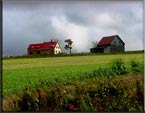
I think of my father,
who never seemed
to feel at home,
except in his own
home - and even
there, much often
did not feel homey.
father and daughter stories
He felt safest
in his own home ...
father and daughter stories
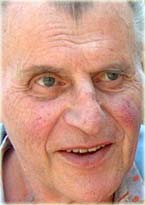
All around
are the places
we live in.
But what
does it mean,
to be at home?
My father
never felt
at home.
In my own,
my chosen home - explorations,
reflections,
word pieces
on the sense
of home -
father and daughter stories
along with
father and
daughter
stories,
and also
father
daughter
love,
writings
from daughter
to father -
daughter
and father
in so
many
ways
connected.
father and daughter stories
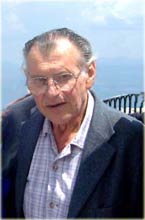
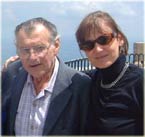
I started by
thinking about
what it means,
to feel at
home.
I came to father
and daughter
stories, father
daughter
love,
the connections
between my father
and myself. So in
some ways, this is
a daughter to
father exploration
and tribute.
father and daughter stories
Father and
Daughter Stories.
Father Daughter
Love. Tribute to
Father. "My father
never felt at home."
Daughter Father
Stories, Daughter
to Father.
My father, myself,
and the feeling
of home.
MENU
****
ON BEING AT HOME:
THOUGHTS
MY FATHER, MY SELF
****
IN MY OWN,
MY CHOSEN HOME
SUMMER'S PASSING
****
POEMS
IN MY OWN,
MY CHOSEN HOME
SUMMER'S PASSING
****
INTERACTIVE FLASH
MUSIC VIDEO!!
SUMMER'S PASSING
****
HOME IS ...
many voices
****
****
MORE POEMS,
SPOKEN WORD,
AND SONGS
****
father and daughter stories
father daughter love,
tribute to father
daughter father stories,
daughter to father
father and daughter stories
father daughter love,
tribute to father
daughter father stories,
daughter to father
father and daughter stories
father daughter love,
tribute to father
daughter father stories,
daughter to father
father and daughter stories
father daughter love,
tribute to father
daughter father stories,
daughter to father
father and daughter stories
father daughter love,
tribute to father
daughter father stories,
daughter to father
HOME -
first version - 2006
ON BEING
AT HOME -
A REFLECTION
At some point, if we’re lucky, we know we're at home. We choose
to stay where we were born - that's where we know we want to be. Or we
move and settle elsewhere, sometimes in the same area, sometimes in a
far-off part of the world - and find that's right for us. Sometimes
we do the choosing. Sometimes we know when we've come to the right spot
- it's as if our home space has been waiting for us. If we're very lucky,
we feel at home in many places, any place we happen to find ourselves.
Home may
be ever-changing.
And what
feels right at one time may not at another.
Some people
never find what feels like home.
But what does it mean: home, a chosen home, being at home, not being at home?
****
I've been wondering about that for years.
But then
my father died, and that brought up so much more. Like: what did home mean
to him, someone who left one continent to come to another, someone who never
seemed to have a full feeling of being at home except in his own home - and
even there, much often did not feel homey.
****
He felt safest in his own home. It was his. It was hard for my mother
to drag him out. He particularly hated sleeping away from home. That
I know.
And yet
I left my parents' home at twenty, and never again slept a night there. I was
not comfortable. Nothing felt right.
****
I am not the good daughter, caring for my parents. I ran away from "home" -
my parents' home. I did not actually run away. I moved out, and not at
such an early age. But I did move far away, inside myself. I did not
want to go back.
My sister
is the good daughter, spending much more time with my parents, at their place,
and taking them into her life.
****
If there is anywhere my father felt truly, deeply at home, it was when
he imagined, imagined himself in the stories he was reading, and when
he was writing, sitting at the computer, writing and reliving.
All his
life, until his last two years when micro-strokes were beginning to do their
damage, he read avidly: westerns, science fiction, encyclopedias, comics, classics.
He lived in them - I know because so did I, and it took me until I was over
thirty to figure out how unlike I was from many of the characters I was living
myself into. They dared things I did not, especially when it came to getting
close to people.
I wonder:
did he ever recognize the ways he was not like the western heroes he read about?
****
I keep coming back to: my father is dead, killed on impact in a fluke
car accident. That my father is dead is new for me, almost unbelievable.
And that has made me think so much about him. I am thinking about him
more than I spent time with my parents in my adulthood.
My partner
has said, it was obvious you loved him a lot, but you just couldn't make it
work in life.
And I think,
what a pity that I could not find, in my father's lifetime anyway, a way of
being with my father - such an intelligent, curious, deeply feeling man - a
way in which we were at home with each other.
He talked
but was not good at listening - except for the one time in my life when I was
hurt enough to call out to anyone and everyone, and he was there, would have
been there for much longer than I wanted it. But soon he was calling to offer
his shoulder and I was no longer suffering that much - and we went back to
my calling him occasionally, and to his talking about himself, cutting me off
when I talked, and to my listening and resenting.
I don't
know what the calls were like for him - he could just talk and talk - but he
probably sensed that he did not get deep listening. Two lonelinesses on the
phone.
****
Home. When I left home, I found out, to my amazement, how easy it was
to keep a place neat and homey, so that I would feel a welcome coming
at me when I entered.
It had always
been too much for my mother - though not for other women, as I was amazed to
discover when I entered other homes as a child. How is it possible, I wondered,
that the places are so tidy?
I found
out that it was easy for me when I left home - and came home in another way.
Home as a restful place, things in place. No very organized neatness, but a
general sense of comfortable things all around.
****
And yet I took so much from home, so many unwanted things: my shyness,
my being ill at ease, my not daring to reach out, my sense of being forever
the unwelcome outsider. The world was not my home space - though I wanted
so much to help with the world, with the misery, poverty, violence, war.
But I could
not find a way to make the world my home. I found a partner, a caring partner,
but I could not make that a true home either.
I was locked
inside myself, locked even from myself.
I was not
at home.
And after
the first tiny place, where I lived alone, even most of the places I lived
were not what I wanted. I did so much of the home-making (curtains, sheets,
towels, arranging), but we lived in places of my partner's choice: he liked
high rises (all finished, easy to maintain) and I never felt at home in them.
Later he liked old houses, but that was mainly after our time.
I was at home when I was reading - but could not find a home for my writings. In that, I was maybe again like my father, though I dared, unlike him, to send things to publishers.
****
Maybe I was drawn to exploring the meaning of home because home is where
I have not fully been. And maybe for that reason, the country place my
partner and I have made our home is especially important to me. That
is where the words that became the spark for this project came to me: "in
my own, my chosen home."
And yet
for years that place was the least homelike of any space I have been in: ceilings
down, plaster and construction material everywhere, walls gutted, nothing working,
windows installed in sub-zero January weather.
The dream
of home was strong. From the first, it felt like it could be home - though
later I often despaired.
I wrote
about it as my chosen home long before it was finished.
In this place too, my partner and I are learning, or trying to anyway, to create the core of a home: loving togetherness.
****
And that brings me back to my father - because he and my mother in many ways could not manage this, though each tried in their own way.
****
I think again of my father. Of his last night.
He did not
feel at home on his last night. He was feeling less and less at home in himself.
A micro-stroke in his thalamus had left him easily confused about time and
space. What had, all his life, given him pleasure - thinking, reading, writing
- no longer felt right. Physical work was coming to be harder and harder. A
pill he took the last two days (a pill prescribed by a doctor after my call
to the doctor) had the unwanted effect of making him more anxious, rather than
more relaxed - though the dose was minimal.
On his last
night, he went for a walk into the night. My mother woke up, called, could
not find him, was terrified, had chest pains. The police were called - and
found him less than a ten-minute walk from the house, on the road he took so
often with my mother. He was so ashamed - to be picked up by the police. And
my mother was angered - how could he do such a thing to her? She could not
understand he was helpless against what was happening to him. He was restless,
needed to move.
I did not find out what had happened until the next afternoon. Missed
calls, missed connections.
I finally
found out and talked to him, maybe forty-five minutes before his death.
"It
is getting worse and worse around here," he said. "This is not a
good place anymore." I thought of his shame at being picked up by the
police.
"You
would have done the same," I said. "If you had woken up and found
Mommy gone, you would have called the police - because you care about her and
you would want her safe."
"Yes," he
said, sounding relieved. "Yes, I would have done that." Because yes,
he would have done whatever he could to take care of her, protect her.
It felt
to me as if something eased inside him, maybe as if his sense of shame dropped
away, as if he saw himself as a rescuer, ready to call on any help to rescue
my mother, should she ever get lost.
At any rate,
that is my fantasy.
****
But I did not go to my parents' place, over an hour away. My sister was there. I was busy. Had a deadline two days away. My sister would have liked me to come. I chose not to.
****
I will never know for sure if I eased his mind or not. Forty-five minutes
later, my father is dead, dead in a car crash. My mother was driving,
survived with no serious injuries.
I don't
know his last thoughts. I do wonder, where did he truly feel at home? He was
not at home in the car. He did not want to go to my sister's, where my parents
were heading - but my mother absolutely needed to get away. But things were
fine once he got into the car.
So where
did he feel truly at home?
Never outside
his own home.
And he himself
made sure - unwittingly - that he was often not welcomed, not in a deep way,
in his own home.
Anger. Rage.
For years, drinking. For almost his whole lifetime, smoking - even when it
brought on huge asthma attacks in his youngest child.
And yet
if there was one thing he wanted, it is - was - to love and be loved.
****
Home.
My partner
and I found what I call our chosen home a few years ago - just the barest of
hints of what it could be - and yet the view was there, and an old building,
pre-renovated in ways that did not suit us.
But at most,
what we found was a building.
****
Home - a place we feel at home in, secure, at one, ourselves, safe, protected, at peace.
****
The key's in the lock. I turn it, open the door carefully - to be sure
the dogs don't whip out.
I am at
home. I can relax, let down my guard, my hair, whatever. A weight is off my
shoulders. No one is watching - when I am alone.
Of course
that often means loneliness. My partner is off working thousands of miles away.
But togetherness is also not always easy. Does one of us want to work, day
after day, way later than the other? So many other things come in.
****
I was at home, deeply at home, nowhere as a child. Not at school though
I was a good student who loved learning, not on the street though I loved
playing. My sister and I were outsiders, members (by virtue of where
we came from) of a bad group.
Home was
the safest place.
Much about
it was good. Music. Books. Two parents who wanted the best for their children,
organized their lives around us, supported me when I wrote and put on a play
(which took three years in the doing). My father dreamed along with me when
I read comics. He cared about injustices.
Of course
there were good times. Lots of good times. And there was so much trying.
I remember
the hope and the trying - and the sense that things were always a bit too much,
like making it in this confusing new world where the old ways of making a living
did not quite work, where the rules were different.
Some
things were, out and out, not so great. My father's anger - not frequent, but
intense. My anger - such a source of shame. I did not want it, hated it, always
believed I would now never get angry again because I certainly did not want
to. My mother's difficulty hearing some things, things to do with feelings
and also the outside world, when reality conflicted with her beliefs. My sister
and I had a world of our own - partly safe and partly not.
When I look
at photos of my child self, I see a shy child, held inside herself, ill at
ease, and yet sure about doing things in different, unusual ways (like my hair)
- individual, not trying to be like others. I put on a play though no one else
did anything like that, except in the books I read. But I was also terrified
of being laughed at, which made me a bad actress in the play I put on.
Again I come to my question: what really makes us feel at home?
****
My father would not have felt at home in the place this project had
its first presentation/vernisssage - an art gallery.
One of his
most intense experiences of shame happened at the Vienna Opera House. He was
maybe sixteen. An actress from his home village gave him a ticket. It was after
the war. He was young and poor. All he had to wear was a pair of white shorts
and a short-sleeved white shirt - or was it a white undershirt? The actress
said anything was fine.
But everyone
else, every other man, was in black tie and tails.
Shame.
He knew,
in his head, that what he wore did not matter. What mattered was what was inside
himself. Those were his beliefs, and those beliefs led him to go to the Opera
House.
The beliefs
did not help him with what he felt. They did not do away with the inside cringing,
the sense of being forever outside.
Of course
he was also good at making others - me, at any rate - ashamed of him. I remember
his being in an undershirt when my partner and I came to visit. It was a visit
relatively early in our relationship. My father then proceeded to demonstrate,
in harrowing detail, exactly how to comb hair (hair forward, hair back, hair
sideways) to prevent baldness. It was quite a while before he could be persuaded
to put on a shirt.
I was certainly
not proud of him. Probably I was a bit too fragile inside myself just to laugh
it off.
I did not
feel at home.
*****
You are ashamed of this place, my father said a few years ago about
my parents' home. I did not want to say yes, so I said nothing. Peeling
tarpaper on the outside. A balcony covered by more tarpaper. Everything
cramped, crowded, overwhelming on the inside. So many marvelous touches,
so much work - and so much that did not come together. I just wanted
to run.
And once
again, shame. I have never felt proud to take anyone to my parents' place.
I have, about so many things, been proud of my parents: their generosity, their
caring, my father's reading and questing and thinking. They wanted me to do
whatever it was I wanted to do. They backed me. My father was pleased when
I went to university.
But not
only was I not at ease in their place. Even before I left home, I could not
feel at ease, at home inside myself, when with them.
****
But while I did not feel at home with my parents, I did not feel at
home away from home either - except in my very own space, mine.
And in that,
I recognize I was very much like my father. He invited, wanted everyone to
come to him - because he did not feel really welcome, at ease, elsewhere.
****
Maybe coming to be at home is a project I have inherited from my parents.
Neither came from a warm, secure, loving home. Both did much better than
was given to them, and yet there was such a distance left to go. I am
trying my own best, which so often is also not as good as it could be,
should be. My father died with only a snippet of comfort from me - I
could have, should have, done better. been much more present for him
so the world he was coming to inhabit (a world changed by his stroke
which damaged his sense of time and space) would be a warmer place, less
threatening, more a home.
And a month
later my dog died, was hit by a car, because I allowed her out near our country
place though I never felt right doing that. My partner thought I was foolish
not to let her run as she liked - hardly any cars went past our place. And
I could not hold to my own certainty that, even if there was hardly ever a car, just one car could kill Fluffers, who loved chasing them - an instinctive
bit of behavior she must have inherited from hunting times, when a pack of
wolves would tackle an animal and bring it down and kill it. Not a good piece
of genetic programming for a dog with huge metal monsters which kill if the
dog is struck by them and sent flying. But my task was to protect her from
herself, and that night I did not do that.
I heard music in my head, driving to my father after his death, and again when driving a day after Fluffers' death. The songs were different. For my father, I heard a song from childhood, an old Viennese song (my parents are from Vienna) with a soft lilt:
Sag'
beim Abschied
leise
Servus
nicht
Lebwoll
und
nicht Adieu
diese
Woerter
tun
nuhr Weh
doch
das kleine
Woertchen
Servus
ist
ein lieber letzter Gruss
wenn
mann Abschied
nehmen
muss
when
there has to
be
a leave-taking
say
when leaving
softly
Servus
not
goodbye
and
not farewell
in
these words
dwell
too much pain
but
that tiny
word
Servus
is
a loving last greeting
when
we meet
a
last time
for
leave-taking
Servus is what the Viennese say on meeting and leaving.
The pain
of leave-taking is in the song - we are to say Servus because other words hurt
too much. So the pain is obviously there, just softened by the word.
I can see
my father now, in my mind's eye, dancing to it, in a wonderful shirt of my
sister's (a shirt he wore several times on the last holiday he took, the first
I took him and my mother on). He is dancing in it, alone, then with me, then
my sister, then my mother. His clothing changes, to the formal black tie and
tails he wore to the Opera Ball, where my sister sent him and my mother. Then
he is back alone, walking down a road he walked on in that last holiday. I
hope my little dog is with him.
For Fluffers the song is different: Hopelessly Devoted to You. I had
been playing the soundtrack to Grease on her last day, while making breakfast,
and I must have heard that piece.
The day
after her death I had to leave the house for a few hours. Driving away, first
I saw her (in my mind's eye), on my lap, as she often was, when she was a puppy,
licking my face happily. Later during the drive, about an hour later, she changed
and licked my face frantically - as she would frantically be affectionate if
she was hurt in any way, as if to say, I didn’t mean it, love me - or
as if to say, take the hurt away, take the hurt away. And I could only think
of her last minute, so badly hurt, when the best I could do was call her name
lovingly, but could not take the pain away. And then Hopelessly Devoted to
You began to play in my head, over and over and over. And then You're the One
I Love.
I don’t
know if one can soothe after death - if something of a creature stays and may
need soothing, but in my mind's eye, I tried to comfort her, tell her, it's
all right, it’s all right, good girl, good girl, Fluffers is a good girl,
Elsa loves you, everything will be all right, everything will be all right.
Maybe the
song was my way of soothing myself. Of lessening the sense of emptiness and
sorrow. And maybe it also told the truth of the relationship between Fluffers
and myself.
And then
the song changed to The World is Empty Without You - again maybe to soothe
her, because she so wanted all the love, and maybe also because though my love
flows in other directions, my life did feel deserted, empty, without her.
I am still trying to make a good enough home, for whoever is in it and comes into it. And I will keep my father and Fluffers - and others - inside my heart, a home space for them.
Elsa
May 1, 2004
copyright © Elsa Schieder 2004, 2015 - all rights reserved
publishing house - FlufferDuff Impressions 2004, 2015 - all rights reserved
contact your thoughts what home means to you
To go to in my own, my chosen home -
which came to me as my home was starting to come together,
click here.
To go to Die Sehnsucht, one of my father's poems
about the longing for home
click here.
Father and Daughter Stories. Father Daughter Love. Tribute to Father.
"My father never felt at home."
Daughter Father Stories, Daughter to Father.
My father, myself, and the feeling of home.
All around are the places we live in. But what does it mean, to be at home?
My father never felt at home. In my own, my chosen home -
explorations, reflections, word pieces on the sense of home.
____________________________
my father myself, father and daughter stories, father daughter love, tribute to father,
father and daughter stories, daughter to father, daughter father intimacy,
father and daughter relationship, daughter father story, daughter and father,
home is where the heart is, no home for my father, father and daughter stories,
father and daughter stories, father daughter love,
healing old hurts, my father myself, father daughter love,
father and daughter stories, tribute to fathers,
tributes and more tributes, yet so much water under the bridge, messy water,
turbulent water, water flowing strong, and water stagnant,
my father myself, father daughter love, daughter father love,
father and daughter stories
if love is the answer that still leave so many questions, like how can one feel at home,
how can I feel at home, and how can I feel at home with my father,
with my father it's long been feeling most at home with him in my heart, in myself,
harder when we were together,
father and daughter stories, father daughter love,
daughter father story, daughter to father, daughter and father, daughter father intimacy,
father and daughter stories, father and daughter relationship, forever together,
father and daughter stories ever growing, ever going on,
father daughter love, so many connections and complexities,
so much my father myself, father and daughter stories,
tribute to father, daughter father intimacy, father daughter love,
daughter and father
- home
____________________________
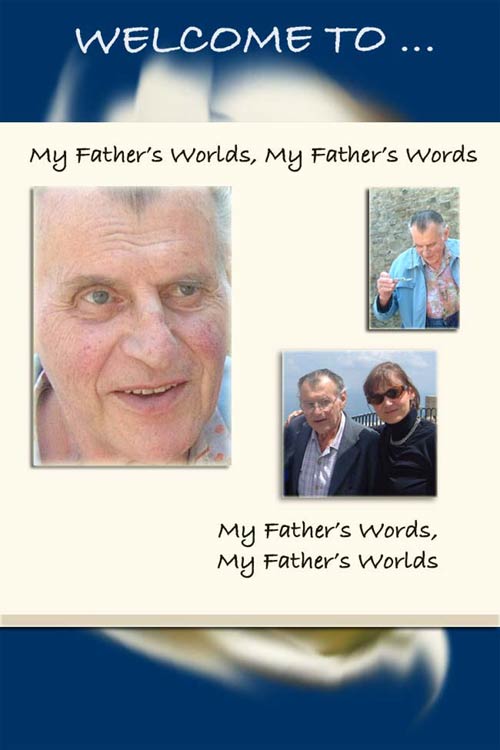
My promise: THE START WILL BE ON THE WEB BY
December 31, 2008 -
A GIFT TO MY FATHER AND THE WORLD
That was my promise, and I kept it.
His poems - often about longing, like Die Sehnsucht -
- now (Oct 09) get about 1000 readers a month.
